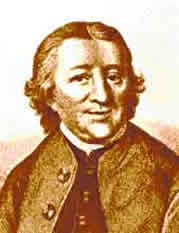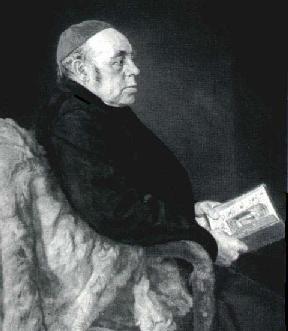Sir George Adam Smith, The Book of the Twelve Prophets
But all this � the reasonableness of the hope of resisting Assyria, the valor which so stubbornly fought her, the religious faith which sanctioned both valor and hope � only the more vividly illustrates the singular independence of the prophets, who took an opposite view, who so consistently affirmed that Israel must fall, and so early foretold that she should fall to Assyria.
The reason of this conviction of the prophets was, of course, their fundamental faith in the righteousness of Jehovah. That was a belief quite independent of the course of events. As a matter of history the ethical reasons for Israel�s doom were manifest to the prophets within Israel�s own life, before the signs grew clear on the horizon that the doomster was to be Assyria. Nay, we may go further, and say that it could not possibly have been otherwise. For except the prophets had been previously furnished with the ethical reasons for Assyria�s resistless advance on Israel, to their sensitive minds that advance must have been a hopeless and a paralyzing problem. But they nowhere treat it as a problem. By them Assyria is always either welcomed as a proof or summoned as a means � the proof of their conviction that Israel requires humbling, the means of carrying that humbling into effect. The faith of the prophets is ready for Assyria from the moment that she becomes ominous for Israel, and every footfall of her armies on Jehovah�s soil becomes the corroboration of the purpose He has already declared to His servants in the terms of their moral consciousness. The spiritual service which Assyria rendered to Israel was therefore secondary to the prophets� native convictions of the righteousness of God, and could not have been performed without these. This will become even more clear if we look for a little at the exact nature of that service.
In its broadest effects, the Assyrian invasion meant for Israel a very considerable change in the intellectual outlook. Hitherto Israel�s world had virtually lain between the borders promised of old to their ambition � �the river of Egypt, and the great river, the River Euphrates.� These had marked not merely the sphere of Israel�s politics, but the horizon within which Israel had been accustomed to observe the action of their God and to prove His character, to feel the problems of their religion rise and to grapple with them. But now there burst from the outside of this little world that awful power, sovereign and inexorable, which effaced all distinctions and treated Israel in the same manner as her heathen neighbors. This was more than a widening of the world: it was a change of the very poles. At first sight it appeared merely to have increased the scale on which history was conducted; it was really an alteration of the whole character of history. Religion itself shriveled up, before a force so much vaster than anything it had yet encountered, and so contemptuous of its claims. �What is Jehovah,� said the Assyrian in his laughter, �more than the gods of Damascus, or of Hamath, or of the Philistines?� In fact, for the mind of Israel, the crisis, though less in degree, was in quality not unlike that produced in the religion of Europe by the revelation of the Copernican astronomy. As the earth, previously believed to be the center of the universe, the stage on which the Son of God had achieved God�s eternal purposes to mankind, was discovered to be but a satellite of one of innumerable suns, a mere ball swung beside millions of others by a force which betrayed no sign of sympathy with the great transactions which took place on it, and so faith in the Divine worth of these was rudely shaken � so Israel, who had believed themselves to be the peculiar people of the Creator, the solitary agents of the God of Righteousness to all mankind, and who now felt themselves brought to an equality with other tribes by this sheer force, which, brutally indifferent to spiritual distinctions, swayed the fortunes of all alike, must have been tempted to unbelief in the spiritual facts of their history, in the power of their God and the destiny He had promised them. Nothing could have saved Israel, as nothing could have saved Europe, but a conception of God which rose to this new demand upon its powers � a faith which said, �Our God is sufficient for this greater world and its forces that so dwarf our own; the discovery of these only excites in us a more awful wonder of His power.� The prophets had such a conception of God. To them He was absolute righteousness � righteousness wide as the widest world, stronger than the strongest force. To the prophets, therefore, the rise of Assyria only increased the possibilities of Providence. But it could not have done this had Providence not already been invested in a God capable by His character of rising to such possibilities.
Assyria, however, was not only Force: she was also the symbol of a great Idea � the Idea of Unity. We have just ventured on one historical analogy. We may try another and a more exact one. The Empire of Rome, grasping the whole world in its power and reducing all races of men to much the same level of political rights, powerfully assisted Christian theology in the task of imposing upon the human mind a clearer imagination of unity in the government of the world and of spiritual equality among men of all nations. A not dissimilar service to the faith of Israel was performed by the Empire of Assyria. History, that hitherto had been but a series of angry pools, became as the ocean swaying in tides to one almighty impulse. It was far easier to imagine a sovereign Providence when Assyria reduced history to a unity by overthrowing all the rulers and all their gods, than when history was broken up into the independent fortunes of many states, each with its own religion divinely valid in its own territory. By shattering the tribes Assyria shattered the tribal theory of religion, which we have seen to be the characteristic Semitic theory � a god for every tribe, a tribe for every god. The field was cleared of the many: there was room for the One. That He appeared, not as the God of the conquering race, but as the Deity of one of their many victims, was due to Jehovah�s righteousness. At this juncture, when the world was suggested to have one throne and that throne was empty, there was a great chance, if we may so put it, for a god with a character. And the only God in all the Semitic world who had a character was Jehovah.
It is true that the Assyrian Empire was not constructive, like the Roman, and, therefore, could not assist the prophets to the idea of a Catholic Church. But there can be no doubt that it did assist them to a feeling of the moral unity of mankind. A great historian has made the just remark that, whatsoever widens the imagination, enabling it to realize the actual experience of other men, is a powerful agent of ethical advance. Now Assyria widened the imagination and the sympathy of Israel in precisely this way. Consider the universal Pity of the Assyrian conquest: how state after state went down before it, how all things mortal yielded and were swept away. The mutual hatreds and ferocities of men could not persist before a common Fate, so sublime, so tragic. And thus we understand how in Israel the old envies and rancors of that border warfare with her foes which had filled the last four centuries of her history is replaced by a new tenderness and compassion towards the national efforts, the achievements, and all the busy life of the Gentile peoples. Isaiah is especially distinguished by this in his treatment of Egypt and of Tyre; and even where he and others do not, as in these cases, appreciate the sadness of the destruction of so much brave beauty and serviceable wealth, their tone in speaking of the fall of the Assyrian on their neighbors is one of compassion and not of exultation. As the rivalries and hatreds of individual lives are stilled in the presence of a common death, so even that factious, ferocious world of the Semites ceased to �fret its anger and watch it for ever� (to quote Amos� phrase) in face of the universal Assyrian Fate. But in that Fate there was more than Pity. On the data of the prophets Assyria was afflicting Israel for moral reasons: it could not be for other reasons that she was afflicting their neighbors. Israel and the heathen were suffering for the same righteousness� sake. What could have better illustrated the moral equality of all mankind! No doubt the prophets were already theoretically convinced of this � for the righteousness they believed in was nothing if not universal. But it is one thing to hold a belief on principle and another to have practical experience of it in history. To a theory of the moral equality of mankind Assyria enabled the prophets to add sympathy and conscience. We shall see all this illustrated in the opening prophecies of Amos against the foreign nations.
But Assyria did not help to develop monotheism in Israel only by contributing to the doctrines of a moral Providence and of the equality of all men beneath it. The influence must have extended to Israel�s conception of God in Nature. Here, of course, Israel was already possessed of great beliefs. Jehovah had created man; He had divided the Red Sea and Jordan. The desert, the storm, and the seasons were all subject to Him. But at a time when the superstitious mind of the people was still feeling after other Divine powers in the earth, the waters and the air of Canaan, it was a very valuable antidote to such dissipation of their faith to find one God swaying, through Assyria, all families of mankind. The Divine unity to which history was reduced must have reacted on Israel�s views of Nature, and made it easier to feel one God also there. Now, as a matter of fact, the imagination of the unity of Nature, the belief in a reason and method pervading all things, was very powerfully advanced in Israel throughout the Assyrian period.
We may find an illustration of this in the greater, deeper meaning in which the prophets use the old national name of Israel�s God � Jehovah Seba�oth, �Jehovah of Hosts.� This title, which came into frequent use under the early kings, when Israel�s vocation was to win freedom by war, meant then (as far as we can gather) only �Jehovah of the armies of Israel� � the God of battles, the people�s leader in war, whose home was Jerusalem, the people�s capital, and His sanctuary their battle emblem, the Ark. Now the prophets hear Jehovah go forth (as Amos does) from the same place, but to them the Name has a far deeper significance. They never define it, but they use it in associations where �hosts� must mean something different from the armies of Israel. To Amos the hosts of Jehovah are not the armies of Israel, but those of Assyria: they are also the nations whom He marshals and marches across the earth, Philistines from Caphtor, Aram from Qir, as well as Israel from Egypt. Nay, more; according to those Doxologies which either Amos or a kindred spirit has added to his lofty argument, Jehovah sways and orders the powers of the heavens: Orion and Pleiades, the clouds from the sea to the mountain peaks where they break, day and night in constant procession. It is in associations like these that the Name is used, either in its old form or slightly changed as �Jehovah God of hosts,� or �the hosts�: and we cannot but feel that the hosts of Jehovah are now looked upon as all the influences of earth and heaven � human armies, stars and powers of nature, which obey His word and work His will.


